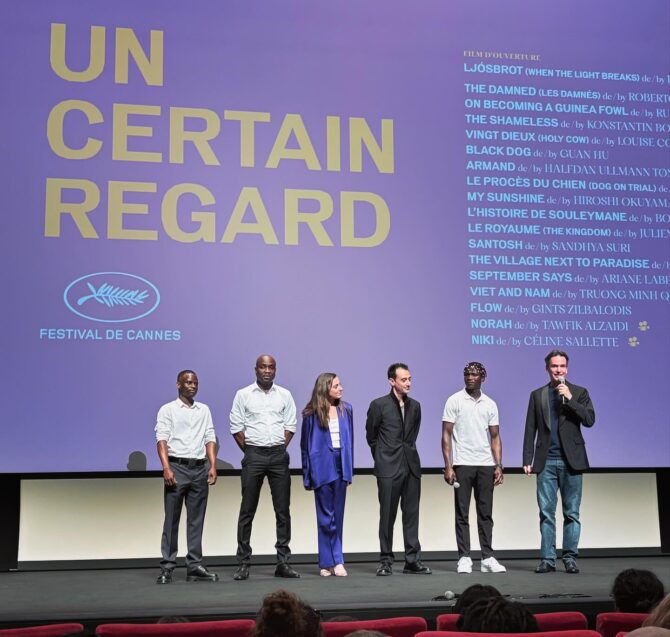L’Histoire de Souleymane: A Refugee Story Set in Paris
- SUBSCRIBE
- ALREADY SUBSCRIBED?
BECOME A BONJOUR PARIS MEMBER
Gain full access to our collection of over 5,000 articles and bring the City of Light into your life. Just 60 USD per year.
Find out why you should become a member here.
Sign in
Fill in your credentials below.
The film elicited a teary, 10-minute standing ovation at Cannes
Critics and audiences at Cannes are notoriously ruthless; it’s not unusual for someone to “boo” at the screen or walk out from a film that isn’t holding their attention. That’s why it’s even more special when a film is a home run and wins over every single person in the cinema, which is precisely what happened during the premiere screening of L’Histoire de Souleymane, which debuted at the Cannes Film Festival this year.
After the film’s premiere, there was a 10-minute standing ovation for the cast and the director inside the Debussy Theater. Tissues were handed to the film’s star, actor Abou Sangare, who portrayed Souleymane to much positive reception. The film’s director, Boris Lojkine, looked on proudly. This is Lojkine’s third film.
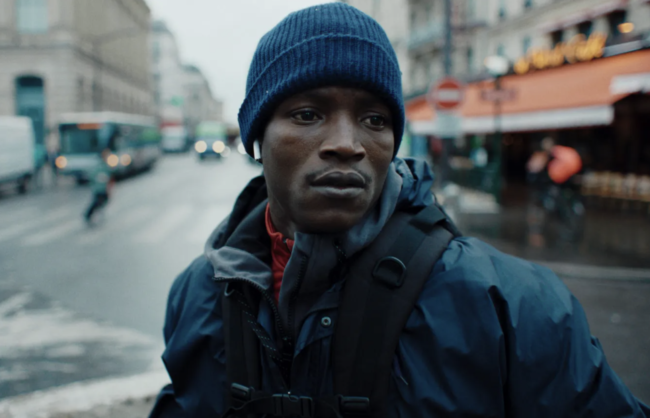
“L’Histoire de Souleymane”
L’Histoire de Souleymane is a story about survival in Paris, showing a different side of the City of Light. It’s not the Paris typically portrayed onscreen; it’s a grittier, scarier Paris. It’s a Paris where people – refugees, immigrants, asylum-seekers –break their back to hustle and earn a living, often at great lengths that even risk their livelihood.
The titular character Souleymane (Abou Sangare) is a 20-something man from Guinea who escaped his home country to create a better life for his mother, who is mentally ill. He is working illegally as a bicycle food delivery person. Souleymane pays his friend from Cameroon to rent his food delivery account, so he can earn money which will go towards the documents from a Guinean friend which will help him secure asylum in France. Then, he’ll be able to legally work in France and send money home to his mom.
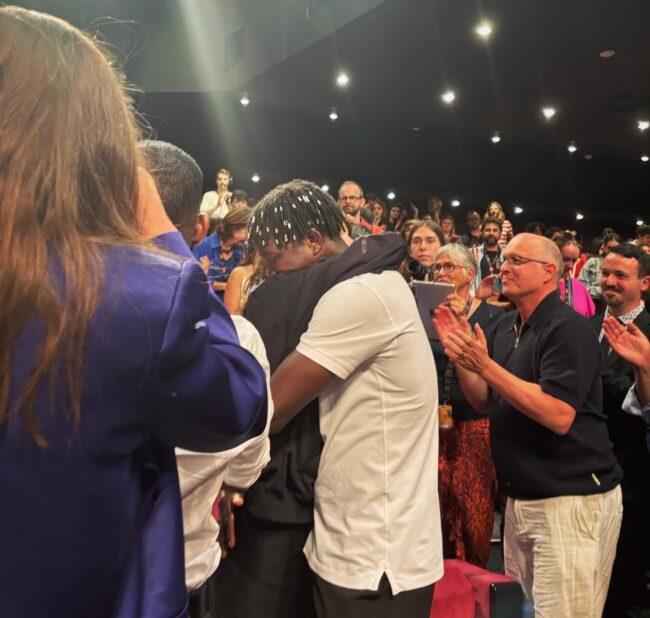
“L’Histoire de Souleymane,” starring Abou Sangaré, premiered at the Cannes Film Festival. Photo: Anne McCarthy
Souleymane is handsome; he has a girlfriend back in Guinea who is tired of waiting for him. She tells him over the phone, after he arrives at the homeless shelter where he sleeps each night, that an engineer proposed marriage to her. “You’re not going to like what I’m going to say,” Souleymane says to her, when she asks him what she thinks. Souleymane is a homeless delivery person who can barely rub two Euros together; he loves this woman and so he urges her to make a better life for herself than the one he can offer her.
This is just one of the many heartbreaking moments from this fast-paced film which takes place over the course of two days. Souleymane is doing his best at every turn, but his best isn’t enough at times. He’s also been through trauma, and that manifests in different ways, like in his temper when the delivery order isn’t ready and when a woman refuses to accept her bag of food after Souleymane and his bike were hit by a car and the food bag became mangled.
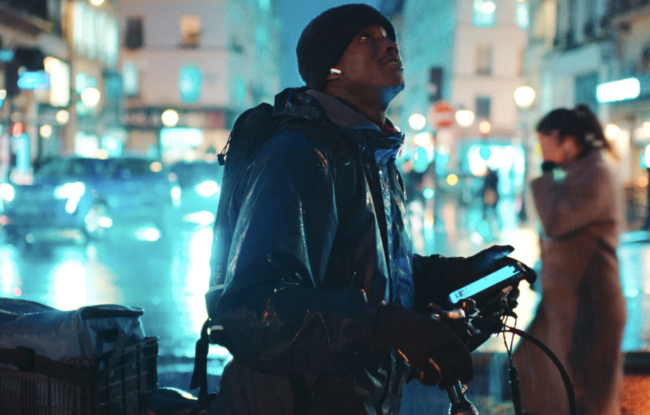
“L’Histoire de Souleymane”
When Souleymane delivers food to a hotel address, but it turns out to be police officers in a van who have ordered the food, there was a collective breath-holding in the theater when the officers realize Souleymane isn’t the same person from the delivery app photo. They let him off, and he pedals on his way, trying to catch the last bus out to the homeless shelter.
The scenes at the homeless shelter are particularly affecting. We see men – and it’s all men – queue up to get some hot tea, a roll of bread, a bit of food, and then queue for a shower where they barely have a moment to themselves before someone bangs on the door. Souleymane sleeps in a bunk bed next to his homeless friend, who helps Souleymane calm his nerves before his asylum application interview. “It’s just like preparing for an exam. And you need your sleep.” Souleymane tells his friend he never graduated and never took an exam.
When his friend who owns the food delivery account screws him over out of money he’s owed, Souleymane tracks him down and they get into a fight. “Why did I come to France?” Souleymane later says, tending to his bruised eye and bloody face.
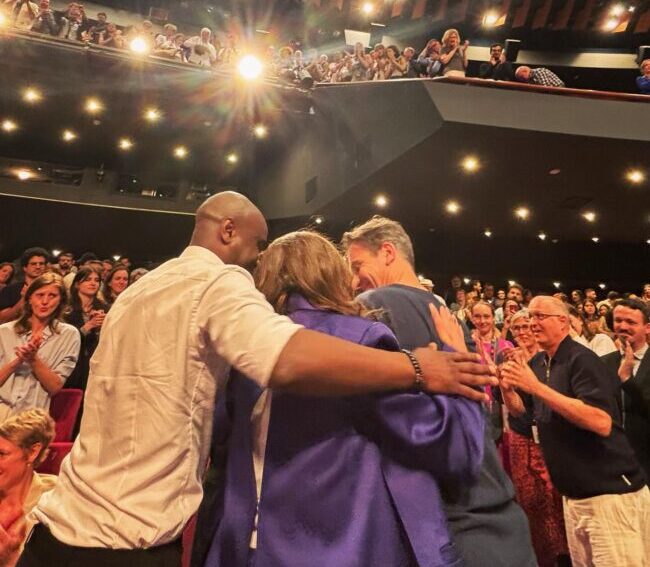
“L’Histoire de Souleymane” premiered at the Debussy Theater at the Cannes Film Festival. Photo: Anne McCarthy
It’s an all-hope-is-lost moment after his friend refuses to give him the money because his account was blocked after Souleymane’s altercation with the woman who refused to accept her food. That scene gave an entirely different perspective of the people who are doing the serving and the delivering and the ones receiving the service. For that woman, it was just a night of refused takeout over the aesthetics of the delivery bag. For Souleymane, it was literally his survival at stake.
L’Histoire de Souleymane is the kind of film everyone should see, and it’s the kind of film that makes Cannes such a special festival, as it highlights the stories we don’t often see. Story connects us all, and it creates empathy for the human experience. Souleymane’s human experience is one man’s obstacle-filled fight to create a better life for himself, and that’s something everyone can relate to, no matter where you’re from, or whether you deliver food or work in an office.
Run – don’t walk – to the theater to see L’Histoire de Souleymane.
Lead photo credit : "L’Histoire de Souleymane" premiered at the Cannes Film Festival. Photo: Anne McCarthy
More in Cannes film festival
